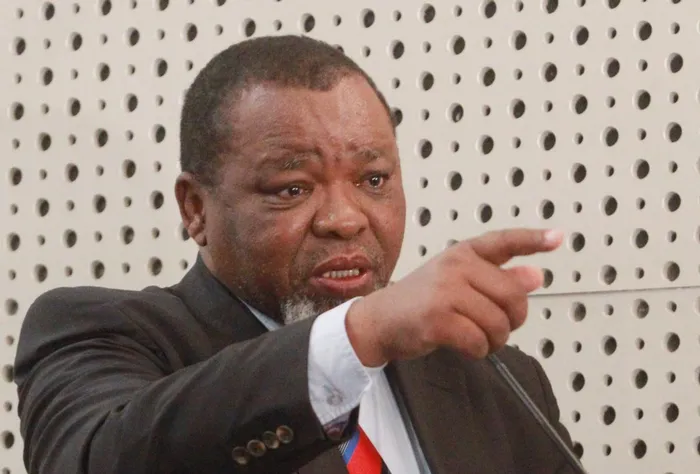Freedom Day message: Mantashe warns against racial division and exploitation of ‘apartheid wounds’

Acting President and Minister of Mineral and Petroleum Resources, Gwede Mantashe.
Image: Jacques Naude / Independent Newspapers
ACTING President Gwede Mantashe has used his Freedom Day speech to warn against the exploitation of “apartheid wounds” to score political points.
In his keynote address during the National Freedom Day celebration held at AJ Swanepoel Stadium in Ermelo, Mpumalanga, the Energy and Mineral Resources Minister warned against those seeking to rekindle racial bitterness.
Mantashe also called out racial tensions.
In February, AfriForum and Solidarity visited the US and reported that there were mass land grabs in South Africa after President Cyril Ramaphosa signed a land expropriation bill into law.
During the visit, the groups requested US President Donald Trump to intensify pressure on ANC leaders to end discrimination against Afrikaners by, among other things, revising the "anti-Afrikaans" Bela law and racial legislation.
The organisations also wanted the Trump administration to act strongly against hate speech that incites violence, such as farm murders in which Afrikaners are the target. They also wanted the ANC to respect the right to property ownership by, among other things, revising the Expropriation Act. They also wanted the governing party to enter into a cultural agreement with Afrikaners that will provide cultural space for Afrikaners in South Africa, which includes the existence of Afrikaans educational institutions.
In a statement issued on February 3, the ANC said AfriForum had long positioned itself as a defender of white minority privilege, using fear-mongering to undermine South Africa’s constitutional and lawful land reform programme. The party said this campaign was not about justice but about blocking economic transformation and maintaining an oppressive status quo.
“AfriForum’s lobbying efforts in the US and other countries have deliberately misrepresented South Africa’s Expropriation Act, which is a fair, constitutional mechanism aimed at reversing historical land dispossession. By weaponising misinformation, they have emboldened some, who have no understanding of South Africa’s democratic processes but are quick to perpetuate racist narratives. It is unacceptable that AfriForum continues to seek external intervention against a sovereign country’s domestic policies - policies that are necessary to address the legacy of land dispossession caused by colonialism and apartheid.”
“President Cyril Ramaphosa has reaffirmed South Africa’s commitment to engaging with international partners on issues of mutual interest. However, the ANC will not tolerate racist distortions aimed at undermining our national sovereignty and transformation agenda. We call on all progressive forces, both locally and globally, to reject AfriForum’s divisive agenda and stand with South Africa in its pursuit of justice, equity, and meaningful land reform,” read the statement.
'The embers of racial bitterness'
Mantashe, who was speaking on behalf of President Cyril Ramaphosa, who could not attend the Freedom Day event after coming down with the flu, said these efforts will fail because even the inhumane system of apartheid failed to destroy what binds “us” together as human beings.
He was addressing the many challenges still facing the country on several fronts as South Africa marked 31 years of democratic dispensation on April 27.
“On this Freedom Day, there is so much we still need to remember and celebrate. Even now, there are people who seek to drive a wedge between us, who seek to rekindle the embers of racial bitterness,” he said.
He said these efforts will fail, adding that history records how people of all races fought against oppression and injustice.
“On this day, we honour those who sacrificed, dreamed and believed in the promise of a better South Africa free of racial division. It took individuals from across our country, religious leaders, traditional leaders, political activists young and old, workers and ordinary citizens to guide our country to democracy, he said, adding that in a few days from now the country will commemorate 110 years since the birth of Beyers Naude, an Afrikaner anti-apartheid activist.
“He was an Afrikaner clergyman whose father helped found the Broederbond, the secretive society that orchestrated and perpetuated apartheid. As a person who occupied a prominent position in apartheid society, and who counted HF Verwoerd as among his university lecturers, Oom Bey (Naude) would go on to play a significant role in fighting the unjust system from which he was a beneficiary.
"On this day, we remember many of our heroes of Afrikaner heritage who took a stance in defence of the liberty and freedom of South Africans: Oom Bey, Bram Fischer, Breyten Breytenbach, Athol Fugard, Ingrid Jonker, and many others who turned their backs on the tyranny of apartheid,” Mantashe said.
"Our apartheid wounds are being exploited to serve the agendas of others,” he emphasised.
Mantashe added: “We must be clear. We will not allow anyone else to define us, to tell us who and what we are, or to turn us against one another. We must roundly reject any attempts to divide us along racial lines. Not again. Never again.”
Mantashe, however, highlighted that the legacy of apartheid continues to manifest itself in nearly all facets of life.
He said poverty, unemployment and inequality are deep wounds that prevent “us” from reaching our full potential as a country.
“We are one of the world’s most unequal societies. It is said that the richest 10% of South Africans own approximately 85% of the country’s financial assets. Millions of people are unemployed or earn wages that cannot sustain them or their families,” he said.
Related Topics: